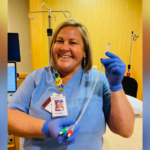Stop the Doomscroll: How to Take Care of Your Online Mental Health
If you’ve lately found yourself experiencing a “tendency to continue to surf or scroll through bad news, even though that news is saddening, disheartening, or depressing,” (as Health magazine describes), likely you’re participating in some “doomscrolling.” It’s a habit that worldwide news headlines or even celebrity gossip can drive you to, but it can especially become an issue when researching a medical condition.
Though it’s tempting to lean on the Internet’s many benefits to help you gain a better understanding of a health condition, an overwhelming amount of negative information can damage your health. A 2014 study in Cyberpsychology, Behavior and Social Networking reported that “For some individuals, repeated searches for medical information on the Internet exacerbate health anxiety.” The reason for this, as clinical psychologist Dr. Amelia Aldao explains, is that “Our minds are wired to look out for threats. The more time we spend scrolling, the more we find those dangers, the more we get sucked into them, the more anxious we get.”
Your doctor or gynecologist should serve as your primary reference for any health concerns you have, but following a few guidelines about online medical research may empower you to be smartly (and healthily) informed.
The Source of Your Material Matters
Identifying the difference between quality online sources and those that are less reliable is one place to start. “As a rule,” the National Institute on Aging advises, “health websites sponsored by Federal Government agencies are good sources of information.” Save a Life by National Health Care Provider Solutions also suggests turning to the CDC, the American Medical Association, or the World Health Organization. You can also look to well-established professional organizations and highly reputed medical schools.
Remember that your doctor uses the Internet too! The providers at Covington Women’s Health Specialists use the websites UpToDate, Mayo Clinic, and The American College of Obstetricians and Gynecologists (ACOG) as resources, which have patient educational materials on them.
The article’s author and publication date can also tell you a lot. Check to see if the information is current, or fact-checked by a credentialed medical professional. If a site is peppered with a lot of patient testimonials, you may want to click past. “Compelling personal testimonials often dissuade people from accepting scientific evidence,” PsychCentral warns. “The vividness of personal testimony often trumps evidence of higher reliability.”
Establish Guardrails Ahead of Time
Before you log in, NPR advises you set goals for your search beforehand by “reminding yourself why you’re there, what are you looking for, what information are you trying to find. And then periodically checking in with yourself — have I found what I needed?”
HuffPost also recommends limiting your search time by setting a timer, using apps that monitor screen time, or carving out dedicated time blocks. This is not only a good way to keep any doomscrolling in check, but can help improve your overall mental health. A 2017 study published in Preventive Medicine Reports “showed that moderate or severe depression level was associated with higher time spent on TV watching and use of computer.”
Partner With a Loved One
Share what you’ve found online with a friend or family member who can ask caring questions, and help you sort through the most valuable information. Their long-time knowledge of you, your lifestyle, emotions and preferences can provide extra support, and you may learn from their own health experiences. “Friendship isn’t just about fun, fellowship and emotional health,” as LiveScience points out. “Having friends can improve physical health, too.”
Remember that your doctor, nurse, gynecologist and other health specialists are here for you in the same way. Each member of our award-winning team considers themselves your partner in your healthcare. Listening to you and communicating with you are what they do best! To arrange a personal appointment call us at (770) 385-8954 or schedule online.








